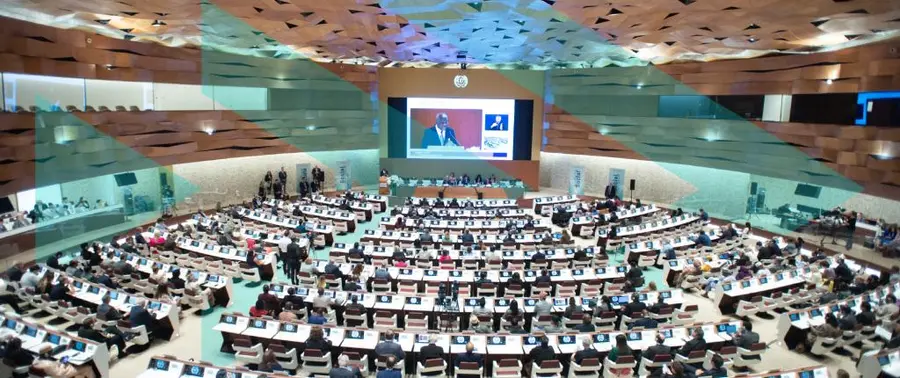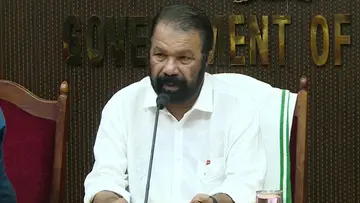Labour
Multi-polarity and Labour Rights: 113th ILC Exposes Global Contradictions

Image courtesy: ILO
K N Umesh
Published on Jun 28, 2025, 05:57 PM | 5 min read
The 113th International Labour Conference (ILC), held in Geneva from 2–13 June 2025, concluded with the adoption of several significant instruments: a new Convention and Recommendations on Biological Hazards, a resolution on standard-setting for the Platform Economy, and a general discussion on promoting transitions towards formality. A historic resolution on Palestine was also passed, upgrading its status from a liberation movement to a non-member observer state, with an overwhelming 386 votes in favour, 12 against, and 42 abstentions.
Seven amendments to the Maritime Labour Convention were adopted, reinforcing the rights of seafarers as key workers. These amendments address repatriation without discrimination, shore leave, fair treatment in maritime casualties, repatriation costs, medical training, and protection against violence and harassment. A separate resolution urged the military regime in Myanmar to honour conventions on freedom of association and the prohibition of forced labour.
The ILC also adopted the ILO’s recommendations to the upcoming UN World Summit for Social Development, scheduled for November 2025 in Qatar. These recommendations urge member states to include employer and worker representatives in the development of national inputs to the summit, and to designate them as advisers within their national delegations. In conjunction, the Global Coalition for Social Justice held its annual summit on 12 June.
Multi-polarity and Contradictions Among Imperialist Powers
A marked feature of this year's ILC was the growing divergence among imperialist nations and the strengthening of multi-polarity. Countries across Africa, Latin America, the Gulf, and the Asia-Pacific consistently aligned their positions with those of the Workers’ Group. Even some advanced economies—like those within the European Union, along with Canada and Mexico—distanced themselves from the Employers’ Group and from the positions of the USA and the UK.
During committee debates on biological hazards, these countries frequently opposed or remained neutral on employer-driven amendments. The Employers’ Group, frustrated by the lack of support for their positions, made pointed remarks in both committee and plenary sessions. The Employers’ Group leader openly lamented the increasing reluctance of nations to support multinational corporations and the silence on employer interests.
Contentious Debate Over Platform Economy
The standard-setting discussion on the platform economy was particularly intense. Strong opposition to adopting a convention with a subsidiary recommendation came from the Employers’ Group, the USA, UK, Japan, China, and India. Despite this, the ILC voted by a significant majority to proceed with a Convention and subsidiary Recommendation on the Platform Economy. The drafting process involved numerous amendments and sub-amendments, culminating in a resolution to adopt a Convention through the double discussion procedure—final adoption is scheduled for the next ILC.
Transition to Formality: Clash Over Class Lines
Discussions on promoting transitions towards formality were contentious, particularly due to the ILO Office’s class-collaborationist approach in its draft report. One example was the inclusion of India’s Employment Linked Incentive (ELI) Scheme, presented as an innovative measure. In reality, this scheme shifts public funds to corporations and promotes insecure, temporary jobs. Despite opposition, the general discussion's draft conclusions were ultimately adopted, made possible by the broader geopolitical contradictions and the assertive roles played by Global South nations.
India’s Isolated, Pro-Employer Stance
Throughout the conference, India stood isolated in its efforts to appease employers—reflecting its close alignment with corporate interests. Although India supported all seven amendments to the Maritime Labour Convention, it voted against the Convention and subsidiary Recommendation on the Platform Economy and abstained from voting on the Convention on Biological Hazards.
India’s interventions in plenary sessions revealed its intention not to ratify these instruments, citing concerns about their lack of alignment with national laws, employer capacity to pay wages during work stoppages, and data-driven assessments. These positions contradicted the prevailing consensus and exposed India’s resistance to worker-centric policies.
In committee discussions, India proposed numerous amendments—most of which failed to gain support. Of the 56 amendments it submitted to the draft text on biological hazards, only one was adopted, while 40 were withdrawn, 11 lacked secondment, and four were rejected. Similarly, out of 10 proposed amendments to the recommendation, only two were adopted. The amendments that passed largely aimed to dilute employer responsibility, harming worker protections.
India also failed to respond to the ILO's 2024 questionnaire on biological hazards, further revealing the government’s anti-labour and pro-corporate stance.
ILC Advisory to Indian Government
The Credentials Committee advised the Indian government to comply with Article 3(5) of the ILO Constitution in future ILC delegations. The committee found India in violation of the article by excluding the Indian National Trade Union Congress (INTUC) and repeatedly denying representation to a woman adviser nominated by the Centre of Indian Trade Unions (CITU).
These issues were raised in a complaint submitted by ten central trade unions to the Credentials Committee. The complaint also highlighted union-busting activities by Samsung India and criticized the ELI scheme for failing to promote formal employment. Representatives from CITU and HMS lodged these complaints during the ILC, reinforcing worker solidarity in the face of employer-aligned state policy.
A World in Crisis
In his opening address, the ILO Secretary-General stated that the world was no better off than a year ago. In his closing remarks, he noted that conditions had worsened, particularly in light of escalating conflict following Israel’s attack on Iran.
Despite these turbulent times, the global working-class movement, along with the assertive roles of African, Latin American, and Gulf countries, played a pivotal role in shaping the conference outcomes. These multipolar dynamics enabled the adoption of several progressive instruments—including the convention on biological hazards, resolutions on the platform economy and formality transitions, and the historic recognition of Palestine—despite strong resistance from the Employers’ Group and backing from imperialist powers such as the USA, UK, Japan, and India.










0 comments